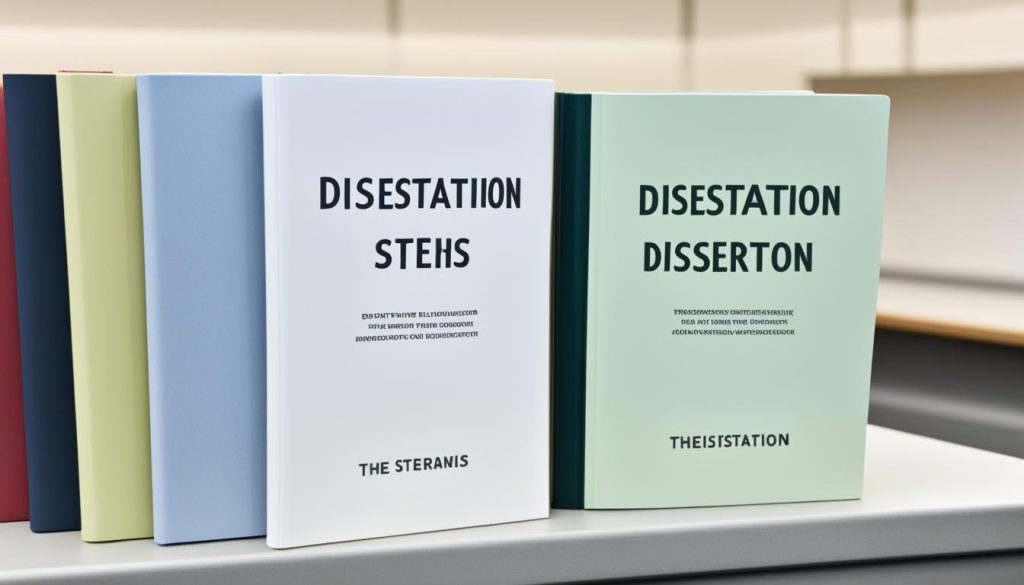A doctoral degree is the highest level of education one can achieve in their field of study. While the specific requirements for doctoral degrees may vary depending on the program and institution, one common question that arises is whether all doctoral degrees require a dissertation. To shed light on this topic, it’s important to understand the role of dissertations in doctoral degrees.
Key Takeaways:
- Doctoral degrees often require dissertations as a culmination of a student’s research journey.
- Dissertations demonstrate a student’s research skills, knowledge, and expertise.
- Doctoral programs may have variations in dissertation requirements.
- Completing a dissertation requires significant time commitment and dedication.
- Support and resources are available for students embarking on their dissertation journey.
Are you considering pursuing a doctoral degree? Wondering what it takes to earn that esteemed title? Look no further! In this article, we will demystify the doctoral requirements by focusing on the role of dissertations in doctoral degrees. Whether you’re an aspiring doctoral student or simply curious about the process, understanding dissertations will provide valuable insights into the world of doctoral education.
The Significance of Dissertations in Doctoral Programs
Dissertations play a crucial role in doctoral programs as they demonstrate a student’s research skills, knowledge, and expertise in their chosen field. These extensive and in-depth research projects provide an opportunity for doctoral students to make a significant contribution to their area of study.
The process of writing a dissertation involves years of research, writing, and collaboration with a dissertation committee composed of faculty members and subject-area experts. This collaborative effort ensures that the dissertation meets the rigorous standards set by the academic community and contributes to the advancement of knowledge in the field.
“Dissertations are not just an academic exercise; they are a gateway to new discoveries and insights that can shape the future of a discipline.” – Dr. Sarah Johnson, Professor of Social Sciences
Doctoral dissertation requirements vary among institutions, but they generally include original research, critical analysis, and a thorough examination of existing literature. Dissertations for doctoral programs are often expected to demonstrate the ability to formulate research questions, design appropriate research methodologies, and analyze data effectively.
Importance of Dissertations in Doctoral Programs
Dissertations provide doctoral students with a platform to showcase their intellectual capabilities and contribute to the body of knowledge in their field. By conducting extensive research and presenting their findings in a comprehensive manner, students establish themselves as experts and gain recognition within their academic community.
Furthermore, dissertations enable doctoral students to develop essential skills such as critical thinking, problem-solving, and effective communication. The process of writing a dissertation requires students to engage in independent research, analyze complex data, and present their findings coherently and convincingly. These skills are highly valued in academia and other professional settings.
“Completing my dissertation was not just an academic achievement, but also a personal milestone that showcased my ability to contribute to my field and pursue my passion for research.” – Dr. Mark Thompson, PhD in Engineering
Additionally, successful completion of a dissertation is often a requirement for graduation in doctoral programs. It serves as a culmination of the student’s academic journey, demonstrating their ability to conduct original research, contribute to scholarly discussions, and advance knowledge within their field of study.
Dissertation vs. Thesis: Understanding the Difference for Doctoral Degrees
When pursuing a doctoral degree, it is essential to clarify the distinction between a thesis and a dissertation. While both are research-based projects, they differ in their purpose and scope. Typically, a thesis is associated with master’s degrees, while a dissertation is the culminating project for a doctoral degree.
A thesis serves as an opportunity for master’s students to demonstrate their research skills and knowledge in a specific subject area. It involves a comprehensive review of existing literature and may include some original research. In contrast, a dissertation is a much more extensive and detailed undertaking for doctoral candidates.
Dissertations require original research, in-depth analysis, and a significant contribution to the field of study. Doctoral candidates must conduct comprehensive investigations into their chosen research topic, often involving data collection, analysis, and interpretation. The outcome of a dissertation should present new insights, theories, or methodologies that contribute to the existing body of knowledge.
Thesis vs dissertation for doctoral degrees: While a thesis is commonly associated with master’s degrees, a dissertation is the definitive research project for doctoral candidates.
Dissertations often take several years to complete, requiring a considerable investment of time, effort, and dedication. Doctoral candidates must navigate the complexities of research design, data collection, and analysis, often under the guidance of a committee of faculty members and subject-area experts.
Thesis vs dissertation for doctoral degrees: Dissertations entail comprehensive research, original contributions, and a higher level of academic rigor compared to theses.
By completing a dissertation, doctoral candidates demonstrate their ability to conduct independent research and their expertise in their respective fields. This rigorous process prepares them for future contributions to academia, professional practice, or policy development.
Thesis vs dissertation for doctoral degrees: Dissertations go beyond demonstrating knowledge; they showcase a doctoral candidate’s ability to conduct original research and make substantial contributions to their field of study.
As the journey towards earning a doctoral degree progresses, an understanding of the differences between the thesis and dissertation becomes crucial. Doctoral candidates must recognize the unique expectations and requirements associated with each type of research project, ensuring they approach their dissertation with the necessary depth, originality, and scholarly rigor.
To gain a clearer understanding of the distinction between a thesis and a dissertation, refer to the table below:
| Thesis | Dissertation |
|---|---|
| Associated with master’s degrees | The culminating project for a doctoral degree |
| Requires a comprehensive review of existing literature | Entails original research, in-depth analysis, and a significant contribution to the field |
| Typically shorter in length compared to a dissertation | More extensive and detailed |
| Measures research and analytical skills | Demonstrates advanced research, critical thinking, and contribution to knowledge |
| Preparation for professional practice or further research | Preparation for contributing to academic scholarship, professional practice, or policy development |

Understanding the difference between a thesis and a dissertation is crucial for doctoral candidates. By acknowledging the unique characteristics of each research project, doctoral candidates can approach their dissertation with the necessary depth, originality, and academic rigor required to make a meaningful contribution to their field of study.
Variations in Dissertation Requirements for Doctoral Candidacy
When pursuing a doctoral degree, it’s important to understand that the requirements for dissertations during the doctoral candidacy phase can vary depending on the program and institution. As you embark on this significant research endeavor, familiarizing yourself with the specific expectations is essential for a successful dissertation journey.
Written Document vs. Oral Defense
Some doctoral programs may require a comprehensive written document as the primary requirement for doctoral candidacy. This written dissertation allows students to showcase their research skills, methodology, findings, and conclusions in a structured and detailed manner.
John Thompson, a doctoral candidate in the field of psychology, described his experience, saying, “For my candidacy, I had to submit a written dissertation that comprised an extensive literature review, research methodology, and analysis of my findings. It was a rigorous process that allowed me to delve deep into my field of study and contribute to existing knowledge.”
On the other hand, certain programs may require an oral defense in addition to a written document. During the oral defense, doctoral candidates present their research to a committee of faculty members and experts in their field. This provides an opportunity for candidates to highlight their research findings, provide further context, and address any questions or concerns from the committee.
Faculty Guidance and Evaluation
Regardless of the format, the doctoral dissertation is typically overseen by a committee of faculty members who provide guidance, feedback, and evaluation throughout the process. These experienced mentors play a crucial role in ensuring that the dissertation meets the high standards of academic excellence and contributes to the field of study. Their expertise and support are invaluable resources for doctoral candidates.
“Having a supportive dissertation committee was instrumental in my journey,” shared Michelle Hernandez, a doctoral candidate in the field of education. “My committee members not only provided me with valuable feedback on my research, but they also guided me through the entire dissertation process, from formulating research questions to defending my findings.”
Throughout the candidacy phase, doctoral candidates should maintain regular communication with their committee members, seeking their guidance and incorporating their suggestions to improve the quality of their dissertation.
The Journey Towards Doctoral Candidacy
The dissertation requirements during the doctoral candidacy phase mark a significant milestone in the journey towards earning a doctoral degree. These requirements serve as a testament to a candidate’s research capabilities, critical thinking skills, and potential to contribute to their field of study. By embracing these requirements and working closely with their faculty committee, doctoral candidates can navigate the complexities of the dissertation process and emerge as knowledgeable experts in their chosen area of research.

Challenges and Time Commitment in Completing a Dissertation
Writing a dissertation is a challenging task that requires a significant amount of time, effort, and dedication. Doctoral students often face various challenges during the dissertation process, including the need to balance research, writing, and editing with other responsibilities.
One of the main challenges in completing a dissertation is the time commitment it entails. The research alone can take months or even years, as doctoral students delve deep into their chosen field of study to gather and analyze data. This rigorous process requires patience, persistence, and meticulous attention to detail.
The Challenge of Balancing Responsibilities
While working on a dissertation, doctoral students must also juggle other responsibilities such as teaching, coursework, and family commitments. This can create a delicate balancing act, as students strive to allocate sufficient time and energy to their research while fulfilling their other obligations.
Completing a dissertation requires dedication, discipline, and effective time management skills. It’s essential for doctoral students to prioritize their pursuits and establish a realistic schedule that allows for progress on the dissertation without neglecting other responsibilities.
The Importance of Self-Care
The demanding nature of dissertation work can take a toll on the well-being of doctoral students. Long hours of writing and research, combined with the pressure to meet deadlines, can contribute to stress, anxiety, and burnout. Therefore, it is crucial for students to prioritize self-care and maintain a healthy work-life balance throughout the process.
- Take breaks: Engage in activities that provide relaxation and rejuvenation, such as exercise, hobbies, or spending time with loved ones.
- Seek support: Connect with peers and mentors who understand the challenges of completing a dissertation. Sharing experiences, advice, and encouragement can provide valuable emotional support.
- Manage stress: Practice stress-management techniques such as meditation, deep breathing, or journaling to alleviate the pressures of the dissertation journey.
Overcoming Obstacles and Staying Motivated
Throughout the dissertation process, doctoral students may encounter obstacles that test their resolve and commitment. These obstacles can include difficulties in data collection, analysis, or the formulation of a coherent argument. It is important for students to approach these challenges with a positive mindset and seek guidance from advisors and mentors.
Remember that completing a dissertation is a significant achievement that demonstrates your expertise and contribution to your field of study. Celebrate milestones along the way and stay focused on the ultimate goal of earning your doctoral degree.

Support and Resources for Dissertation Writing
Embarking on a doctoral dissertation can be a daunting task, but rest assured, you’re not alone in this journey. Universities and academic institutions offer a plethora of support and resources to assist doctoral students in navigating the dissertation process. These resources aim to provide the necessary guidance and tools to help you excel in your dissertation writing and research endeavors.
Writing Workshops
One popular form of support is the availability of writing workshops. These workshops are designed to enhance your academic writing skills and provide valuable insights into structuring and organizing your dissertation effectively. Led by experienced faculty and writing experts, these workshops offer practical strategies and techniques that can elevate the quality of your writing.
Accountability Groups
Joining an accountability group is another fantastic way to stay on track and motivated throughout the dissertation writing process. These groups typically consist of fellow doctoral students who provide each other with support, feedback, and encouragement. By sharing their progress, challenges, and successes, members of accountability groups help maintain a sense of accountability and foster a supportive community.
Faculty Guidance
Your faculty members are invaluable resources when it comes to dissertation writing. They can offer expert advice, share their research insights, and provide critical feedback throughout each stage of the process. Engaging with your faculty members early on and establishing a strong working relationship can greatly enhance your dissertation’s quality and impact.
Online Communities and Forums
Virtual communities and online forums dedicated to dissertation writing can serve as valuable sources of support and camaraderie. These platforms allow you to connect with other doctoral students who are going through similar experiences, exchange ideas, seek advice, and share resources. Participating in these communities not only provides emotional support but also facilitates the sharing of valuable tips and strategies.

Remember, dissertation writing support is readily available to help you navigate the challenges and complexities of the process. Whether it’s writing workshops, accountability groups, guidance from faculty members, or online communities, utilizing these resources will empower you to overcome obstacles and produce a high-quality dissertation.
Strategies for Successful Dissertation Completion
Completing a dissertation is a significant milestone in your doctoral journey. To ensure a successful dissertation completion, it is essential to employ effective strategies and approaches. The following strategies can help you navigate the challenges and ensure a smooth and fulfilling dissertation experience.
Set Realistic Goals
Begin by setting realistic and achievable goals for your dissertation. Break down the project into manageable tasks and establish a timeline for completion. By setting specific milestones, you can track your progress and stay motivated throughout the process.
Establish a Writing Routine
Consistency is key when it comes to dissertation writing. Establish a regular writing routine that works best for you. Whether it’s dedicating a specific time each day or designating certain days for writing, having a structured schedule will help you make steady progress and avoid procrastination.
Seek Feedback and Guidance
Don’t hesitate to seek feedback and guidance from your mentors, committee members, and peers. Their input can provide valuable insights, improve the quality of your work, and align your dissertation with the expectations of your field. Collaborating with others will also help you stay motivated and committed to your project.
Break Down the Dissertation
Breaking down your dissertation into smaller, manageable tasks can make the overall process less daunting. Identify the key sections of your dissertation and create a detailed outline. By focusing on one section at a time, you can maintain clarity, stay organized, and make consistent progress.
Maintain a Positive Mindset
Completing a dissertation is a challenging endeavor, but maintaining a positive mindset is crucial. Embrace the journey, celebrate your accomplishments, and remind yourself of the value and impact of your research. Find ways to stay motivated, whether it’s through self-care practices, seeking support from loved ones, or engaging with your academic community.
Remember, the process of completing a dissertation is not just about the final product; it’s also about personal growth, resilience, and the skills you develop along the way. By implementing these strategies, you can navigate the challenges, stay inspired, and successfully complete your dissertation.

Conclusion
In conclusion, while the specific requirements for doctoral degrees may vary, dissertations are commonly required for doctoral programs. These comprehensive research projects play a vital role in demonstrating a student’s expertise and making a significant contribution to their field of study.
Completing a dissertation is no easy feat. It requires dedication, perseverance, and a deep commitment to the chosen area of research. It involves years of hard work, where doctoral students immerse themselves in extensive research and analysis. However, with the support and resources available, completing a dissertation is a milestone accomplishment in the journey towards earning a doctoral degree.
Through the process of writing a dissertation, students refine their critical thinking, research, and writing skills. The in-depth exploration of their chosen topic not only enhances their knowledge but also contributes to the advancement of their field. Dissertations provide an opportunity for students to push the boundaries of existing knowledge, propose new theories or solutions, and leave a lasting impact on their disciplinary community.
Ultimately, the completion of a dissertation marks the culmination of a doctoral student’s academic journey. It signifies their ability to conduct independent research, think critically, and contribute to the advancement of knowledge in their field. While it may be a challenging endeavor, the fulfillment and sense of achievement that come with successfully completing a dissertation are unparalleled.




No comments! Be the first commenter?